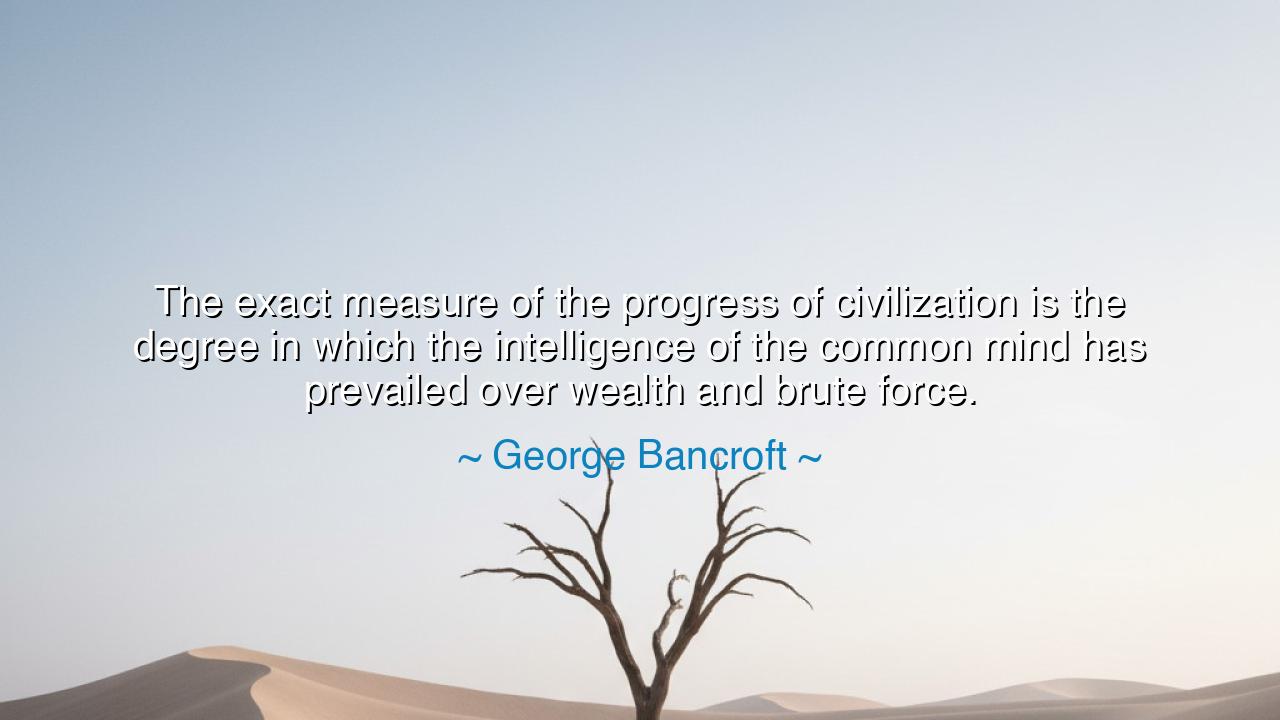
The exact measure of the progress of civilization is the degree
The exact measure of the progress of civilization is the degree in which the intelligence of the common mind has prevailed over wealth and brute force.






The words of George Bancroft, “The exact measure of the progress of civilization is the degree in which the intelligence of the common mind has prevailed over wealth and brute force,” shine like a flame held against the darkness of history. In this single sentence, Bancroft—historian, statesman, and thinker—captures the eternal struggle at the heart of humanity’s ascent. His words remind us that true civilization is not measured by monuments of gold or empires of conquest, but by the quiet triumph of intelligence, of reason, of conscience, rising from among the common people to challenge the arrogance of power and the cruelty of might.
To understand the origin of this quote, we must look to the 19th century, a time of great upheaval and rebirth. George Bancroft, the chronicler of America’s history, lived in an age when nations were torn between the old world of kings and the new world of citizens. The Industrial Revolution was reshaping society, bringing both progress and inequality. Wealth gathered in towers, but knowledge—like light—began to spread among the people. Bancroft saw in this movement the true direction of human evolution: that the destiny of mankind does not lie in the hands of the rich or the strong, but in the awakening of the collective mind—in the victory of wisdom over domination, of thought over violence.
In the ancient world, civilization was too often built upon the backs of slaves and the spoils of war. The Egyptian Pharaohs, the Babylonian kings, the Roman Caesars—each carved their legacies in stone, but all fell to the same fate, because their civilizations rested on the power of wealth and brute force, not on the enduring foundation of intelligence and justice. Yet, from the ashes of their empires rose voices that defied tyranny: Socrates in Athens, who taught that wisdom and virtue, not riches or armies, define the good life; Confucius in China, who declared that the ruler’s strength must come from moral integrity, not from the sword. These were the early signs of the common mind awakening—truth rising from among the people to question the gods of power.
The truth of Bancroft’s words can be seen most vividly in the story of the American Revolution, which he himself studied with reverence. Against the might of the British Empire—a force of immense wealth and military power—stood farmers, craftsmen, and thinkers who believed that reason and liberty could outshine tyranny. They were not rich; they were not many. But they possessed something mightier than coin or cannon: intelligence, rooted in conviction. They spoke of rights, of laws, of equality. Their victory was not merely on the battlefield, but in the mind—the triumph of a new idea: that every person, however humble, bears within them the light of reason and the dignity of freedom.
Throughout history, this battle has been fought again and again. The French Revolution, the abolition of slavery, the fight for universal education—each is a testament to the enduring rise of the common mind. Whenever the people begin to think, to read, to question, civilization grows stronger; whenever thought is silenced by money or might, it declines. Bancroft’s measure of progress is thus a moral compass: it reminds us that civilization is not an accumulation of wealth, but an elevation of spirit. A nation may possess palaces and armies, but if it silences its thinkers, neglects its poor, and prizes profit over wisdom, it remains primitive in soul.
Consider the story of Mahatma Gandhi, who faced the vast empire of Britain not with guns, but with the weapon of conscience. His strength lay not in violence, but in intelligence of the heart—the power to awaken moral reason in both oppressor and oppressed. Through his example, the common mind of India rose, proving Bancroft’s vision true: that when intelligence—guided by compassion—prevails over greed and aggression, civilization advances not by conquest, but by enlightenment.
The lesson of Bancroft’s words is clear and eternal: if we wish to measure progress, let us not look to towers or treasuries, but to the minds and morals of ordinary people. Let us nurture education, wisdom, and empathy, for these are the true engines of civilization. The power of wealth and force is fleeting; the power of understanding is everlasting. Every time a teacher lifts a child from ignorance, every time a voice of truth rises against corruption, every time a citizen acts with conscience rather than fear, civilization takes another step forward.
So, my listener, remember this: the strength of a nation lies not in its riches, but in its reason. The true measure of progress is found in the harmony between intelligence and justice, in the courage of the many to think, to question, and to act with wisdom. Wealth may build cities, but intelligence builds humanity. Let the common mind prevail—then, and only then, will civilization fulfill its destiny, shining not with the brilliance of gold, but with the light of truth.






AAdministratorAdministrator
Welcome, honored guests. Please leave a comment, we will respond soon